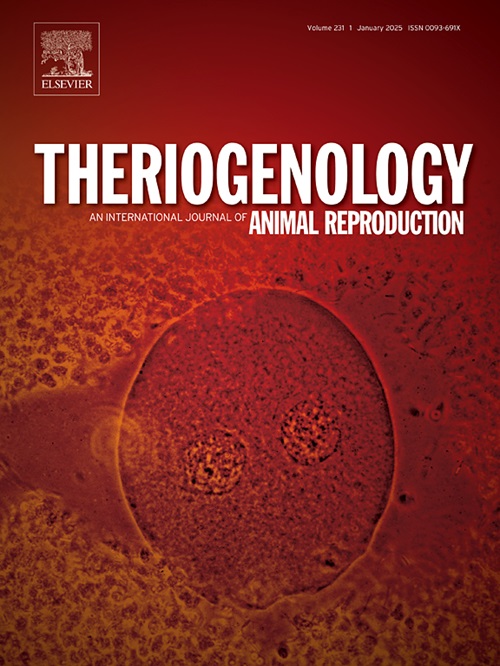Astragaloside IV improves the quality of in vitro postovulatory aged oocytes by decreasing oxidative stress in mice
IF 2.5
2区 农林科学
Q3 REPRODUCTIVE BIOLOGY
引用次数: 0
Abstract
Ovulated oocytes deteriorate rapidly if not fertilized within the optimal timeframe, known as postovulatory aging. Astragaloside IV (AS-IV), an active ingredient of Astragalus membranaceus, has been demonstrated to have anti-aging and antioxidant effects. However, it has not been elucidated whether AS-IV mitigates in vitro postovulatory oocyte aging. Here, AS-IV was administered into the in vitro culture buffer, and we found that its addition could improve the quality of in vitro postovulatory aged oocytes in mice. Specifically, AS-IV treatment enhanced morphological integrity, preserved spindle/chromosome structure, stabilized actin cytoskeleton, maintained centromere cohesion, and improved ovastacin dynamics in aging oocytes. These improvements collectively enhanced sperm binding capacity and subsequent developmental competence following parthenogenetic activation. Mechanistically, AS-IV appears to inhibit mRNA degradation of antioxidant enzymes and sustain mitochondrial function, thereby preventing reactive oxygen species (ROS) accumulation during in vitro oocyte aging. Meanwhile, reduced oxidative stress in AS-IV-treated oocytes may counteract apoptosis-related mRNA accumulation, delaying apoptotic initiation. Taken together, our findings demonstrate that AS-IV supplementation effectively improves the quality of in vitro-aged postovulatory oocytes. This provides a valuable reference and evidence base for its potential application in human-assisted reproductive technology and livestock embryo production.
黄芪甲苷通过降低氧化应激改善小鼠体外排卵后衰老卵母细胞的质量
如果没有在最佳时间内受精,排卵的卵母细胞会迅速退化,称为排卵后老化。黄芪甲苷(Astragaloside IV, AS-IV)是黄芪的一种有效成分,具有抗衰老和抗氧化作用。然而,尚不清楚AS-IV是否减轻体外排卵后卵母细胞衰老。我们将AS-IV加入体外培养缓冲液中,发现它的加入可以提高小鼠体外排卵后老化卵母细胞的质量。具体而言,AS-IV处理增强了形态完整性,保存了纺锤体/染色体结构,稳定了肌动蛋白细胞骨架,维持了着丝粒内聚,改善了衰老卵母细胞的卵泡星动力学。这些改进共同提高了精子结合能力和孤雌生殖激活后的后续发育能力。在机制上,AS-IV似乎抑制抗氧化酶的mRNA降解并维持线粒体功能,从而防止体外卵母细胞衰老过程中活性氧(ROS)的积累。同时,as - iv处理的卵母细胞氧化应激的降低可能会抑制凋亡相关mRNA的积累,延缓凋亡的发生。综上所述,我们的研究结果表明,补充AS-IV有效地提高了体外龄排卵后卵母细胞的质量。这为其在人类辅助生殖技术和家畜胚胎生产中的潜在应用提供了有价值的参考和证据基础。
本文章由计算机程序翻译,如有差异,请以英文原文为准。
求助全文
约1分钟内获得全文
求助全文
来源期刊

Theriogenology
农林科学-生殖生物学
CiteScore
5.50
自引率
14.30%
发文量
387
审稿时长
72 days
期刊介绍:
Theriogenology provides an international forum for researchers, clinicians, and industry professionals in animal reproductive biology. This acclaimed journal publishes articles on a wide range of topics in reproductive and developmental biology, of domestic mammal, avian, and aquatic species as well as wild species which are the object of veterinary care in research or conservation programs.
 求助内容:
求助内容: 应助结果提醒方式:
应助结果提醒方式:


